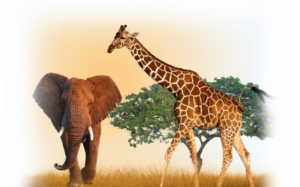May 11-25, 2025
CONSERVATION AND MANAGEMENT OF LARGE AFRICAN MAMMALS
May 11-25, 2025
Open to All Majors, No Pre-Requisites
This 3 credit hour course is aimed at individuals passionate about wildlife who wish to become a part of conservation in action. Wildlife management has become an accepted and necessary part of wildlife conservation. Successful management includes monitoring and moving animals to reestablish the checks and balances of nature in managed systems. This type of work requires specialized training and experience which the students will receive through this wildlife capture course.
This course emphasizes professional and humane animal handling and covers practical techniques to maximize field success and human/animal safety, including chemical and mechanical game capture techniques, drug delivery systems, modern immobilization drugs, wildlife diseases, common species capture, rehabilitation and release of endangered mammals, occupational health hazards, translocation equipment and holding facilities.
This course in which we will explore the conservation issues of large mammals and compare these issues in North America and South Africa. The course includes 11 days in South Africa. Students will receive 10 days of hands-on work and instruction with Parawild Safari operating in the Limpopo Province of South Africa. Parawild instructors will give lectures and demonstrations and include students in the work of animal captures as extensive as possible, limited by field conditions, the species being handled, and safety issues. As conservation is more than just animal captures, Parawild will take us to Kruger National Wildlife Park and we will have cultural activities to better understand the context in which conservation takes place.
Many of the hands-on activities require a high level of physical fitness. The captures will expose you to rough conditions (examples, dense trees and shrubs with thorns or spines, rocky terrain). You must be prepared to camp out in the lovely South African winter, be up very early, work outside, in the sun, doing physical work most of the day and into the night. And you will have the time of your life!
Please contact the program instructor or the Study Abroad Office if you have any questions.
IMPORTANT!
Learn about the May 2025 May Interim study abroad course in South African (AFR 300) Conservation and Management of African Mammals at one of the informational meetings.
This course is open to all majors who are adventurous and passionate about wildlife and want to experience conservation in action. Students will receive specialized training in live, wild game capture while working with Parawild in Limpopo Provenience, South Africa. The course will also include a tour of Kruger National Park, one of the largest wildlife reserves in Africa. For more information, contact Stephanie Foré.
Scheduled Fall 2024 meetings:
Sunday, August 25, 4-5 pm MG 2034
Sunday, September 15, 4-5 pm MG 2034
Sunday, October 20, 4-5 pm MG 2034
Where You’ll Go
May 11-25, 2025
May 11: Depart from Missouri for South Africa (overnight flight).
May 13: Parawild will pick us up from Johannesburg International Airport and take us to our work location in northeast South Africa.
May 14-23: Workshop with Parawild Edu Capture. The schedule of activities and events are fluid as the field projects involve capturing large wild animals. The objectives of the workshop and planned activities include:
- Introduction to conservation principles, the history of game capture, reasons and risks for translocating wild mammals, basic immobilization procedures.
- Discussion of social and economic issues confronting conservation in Africa.
- Lectures on topics such as capture physiology, pharmacology of capture drugs, and practice with darting equipment.
- Hands-on participation in large mammal capture.
- One night in Kruger National Park
- Service in the local communities that may include working with orphans at AIDS Orphanage and other activities provided by Parawild.
May 24: Travel to Johannesburg International Airport.
May 25: Arrive in Missouri
What You’ll Study
“In the wilderness is the preservation of the world” -Henry David Thoreau
Course Name: Conservation and Management of African Mammals
Course Number: AFR 300
Credits: 3.0
Term & Dates: May Interim, May 11-25, 2025
Pre-Requisites: Open to All Majors, No Prerequisites
Degree Fulfillments: Satisfies LSP Intercultural Perspectives Requirement & Counts as Biology elective hours
Click Here to See the Tentative Course Syllabus.
Course Description
Large mammals are important in many functional systems. The Earth was once inhabited with a grand variety of enormous mammals. Today, Africa is the last remaining continent with a great diversity of living large mammals.
In this 3 credit hour course, you will learn about the issues surrounding conservation of these mammals. Our exploration of issues will touch on socio-political, environmental and biological aspects surrounding the future of these magnificent animals.
This course is aimed at individuals passionate about wildlife who wish to become a part of conservation in action. Wildlife management has become an accepted and necessary part of wildlife conservation. Successful management includes monitoring and moving animals to reestablish the checks and balances of nature in managed systems. This type of work requires specialized training and experience which you will receive through this wildlife capture course.
Training emphasizes professional and humane animal handling and covers practical techniques to maximize field success and human/animal safety, including chemical and mechanical game capture techniques, drug delivery systems, modern immobilization drugs, wildlife diseases, common species capture techniques, rehabilitation and release of endangered mammals, occupational health hazards, translocation equipment and holding facilities.
In addition, we will discuss the role of national parks and private lands as living museums and consider the role of these to the needs of local communities and conservation education and research.
This course involves preparatory seminars at Truman State University (1 hr/wk during second block of spring semester) in which we will explore the conservation and issues of large mammals and compare these issues in North America and South Africa. The course culminates in 11 days of hands-on work and instruction with Parawild Safari operating in the Limpopo Province of South Africa. Parawild instructors will give lectures and demonstrations and include students in the work of animal captures as extensive as possible, limited by field conditions, the species being handled, and safety issues. We will visit Kruger National Park and participate in service opportunities in the local community.
Learning Objectives
- Compare and contrast environmental difference between Missouri and South Africa
- Develop a deeper understanding of why large mammals are an important conservation issue
- Develop a deeper understanding of the socio-political constraints in conservation (compare and contrast the United States and South Africa)
- Gain factual knowledge about and hands-on practice in safe and humane handling methods
- Consider why management is part of conservation
Grading Criteria
- 30% Participation: full participation in all discussions and activities is expected.
- 30% Journal: Maintain a journal that includes written summaries of papers read, classes on game capture, and actual capture processes. Will be graded for completeness and the development of scientific thought processes related to conservation and game management as well your personal thoughts and observations.
- 20% Final Written Review: This will be a typed report with prompt to be provided during the spring semester.
- 10% Other graded assignments: These assignments will be homework during the spring semester.
- 10% Deportment: We will be in a different country with different values AND working with wild animals. It is important that we leave a positive impression on the people that we interact with AND conduct ourselves in a way that keeps us all as safe as possible. This includes following the instructions of all instructors.
More course info linked in full syllabus above.
What You’ll Pay
EST. TOTAL COST ON STUDENT BILL: $7,022.44 (undergraduate), $7,357.00 (graduate)
Study Abroad Enrollment Fee: $1,180.44 (ug), $1,515.00 (gr)
Calculated at $393/$505 per credit x 3 credits
Study Abroad Course Fee: $60.00
Calculated at $20.00 per credit x 3 credits
Study Abroad Insurance Fee: $45.00
Calculated at $45.00 per month x 1 month
Study Abroad Travel Fee: $5,737.00
Including: International Airfare, Transportation in Country, Admissions and Cultural Experiences, contingency fund, instructor expenses, student food and lodging.
PAYMENT SCHEDULE
| Options |
Due |
Amount |
|---|---|---|
Early Deposit* |
12/2/2024 |
$200.00 |
OR Regular Deposit (Commitment Deadline)* |
1/15/2025 |
$200.00 |
Payment 1 (Confirmation Payment) |
2/17/2025 (Tentative) |
$3,411.22 (ug), $3,578.50 (gr) |
Payment 2 (Final Payment) |
3/17/2025 (Tentative) |
$3,411.22 (ug), $3,578.50 (gr) |
*Early deposit is required for consideration for Foundation Scholarships. Early Deposits received before 12/2/2024 will be refundable until 1/15/2025.
*Disclaimer: All costs are subject to change by the program instructor or the Center for International Education Abroad.
Your Instructor
Dr. Stephanie Foré
Professor of Biology
sfore@truman.edu | Magruder Hall 3026
http://sfore.sites.truman.edu
Dr. Stephanie Foré is passionate about nature and the study of living things. She is eager to share this passion and believes that experiencing nature through research brings book-learning to life. She currently has an active research lab in which she mentors undergraduate research that often leads to presentation at conferences and publication. She has been nominated several times for Truman’s Research Mentor of the year. In her free time, she serves her country as a Wilderness Volunteer maintaining trails in America’s wild lands.
Early Application Deadline: December 2, 2024
Early Deposit Deadline: December 3, 2024
Students who wish to be considered for Foundation Scholarships will need to complete ALL OF the steps outlined below before December 2, 2024. Truman awards approximately $90,000 in Foundation Scholarships for Faculty-Led Study Abroad Programs in individual awards ranging from $1,000-$4,000. Foundation Scholarships will be announced by December 9, 2025, and students will have until January 15, 2025 to either accept or decline any award. Deposits made before the early deadline of December 3 will be refundable until January 15 regardless of whether an award is received.
Regular Application Deadline: Rolling until January 15, 2025
Admissions for this program are rolling, but we encourage students to complete ALL OF the application steps outlined below as soon as possible, and no later than January 15, 2025 in order to secure a place in the program. All deposits made after December 3, 2024 will be non-refundable unless the program is cancelled.
How to Apply:
- Apply through TruView. Go to TruView > Tools > Student > Student Tools > Registration > Apply to Study Abroad. Truview Applications for this program will open at the start of Fall semester. The application will ask for responses to several short-answer questions, passport information, two emergency contacts, and your acceptance of an assumption of risk and release form and media waivers.
- Submit Additional Materials If Required. After submitting your application, you may be contacted by the Instructor or the Study Abroad Office with a supplemental application document to complete and return. In some cases, an in-person interview may also be required.
- Pay the Truman Cashier a $200 deposit. Once you have been accepted into this program, you will need to immediately pay the Truman cashier a $200 deposit in order to secure your spot in the program.
